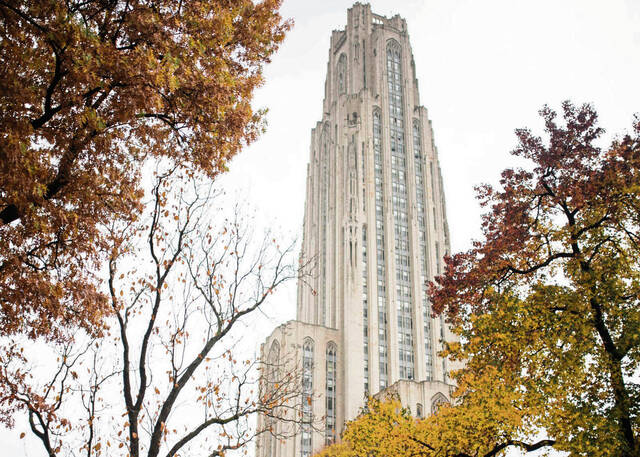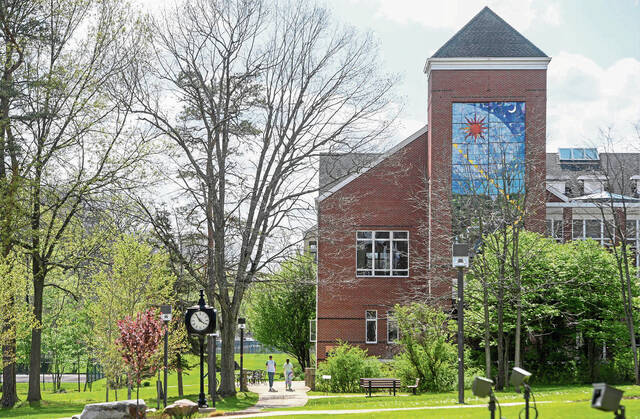Thousands of Pennsylvanians have answered the call to support the University of Pittsburgh’s campaign to keep tuition discounts for in-state Pitt students, school officials report.
The campaign began after some House Republicans indicated they might not support Pitt’s nonpreferred appropriation bill that typically passes in the Pennsylvania budget. The bill provides the average in-state undergraduate student at Pitt’s Oakland campus with about an $8,900 discount each year. Pitt says it adds an additional $6,100 to this, meaning in-state students save, on average, $15,000 annually.
Some Republicans began to question their support for Pitt’s funding after the university published 2020 fetal tissue research that included activities some lawmakers say were illegal and unethical.
Others say they support a statewide college voucher program that would provide funds directly to in-state students at Pennsylvania universities, colleges and technical schools.
Since Pitt’s funding came into question, the university has launched a campaign asking Pitt community members and supporters to “become a Pitt advocate” and contact their local lawmakers about the appropriation bill. Campaign tactics thus far have included a letter of support from Pitt Chancellor Patrick Gallagher, student advocacy in Harrisburg and a bipartisan endorsement from Pitt’s College Republicans and College Democrats.
A Joint Statement by @PghCollegeDems and @PittCR Regarding Pitt’s Annual Appropriation. pic.twitter.com/r03IOGDXTC
— Pittsburgh College Democrats (@PghCollegeDems) April 23, 2022
“Our hope is that once all lawmakers understand the damage that will come from cutting funding for Pennsylvanians, they will continue to do what they have done for over half a century. That is: Approve the state’s appropriation for Pitt,” Pitt spokesman Chuck Finder said via email.
Gov. Tom Wolf’s executive budget proposal for 2022-23 recommends providing Pitt with more than $159 million in general support funding.
Pitt’s tuition for its roughly 17,000 in-state undergraduate students is $19,092. In Pennsylvania, in-state tuition errs on the pricier side, with the average student paying about $14,812 compared to the nationwide average of $9,212.
All states provide in-state funding for universities “primarily through institutional support,” said Terry Hartle, senior vice president of the American Council on Education. “Funding for in-state tuition is designed to help make post-secondary education more affordable to lower- and middle-income families, period.”
However, Republicans who support the college voucher program argue they are supporting all students, not only those who attend state-related universities.
Under the proposal introduced by Hempfield state Rep. Eric Nelson, Pennsylvanians who attend any in-state university, college or technical school would directly receive $8,000 each year if their household income is under $100,000, and $4,000 each year if their household income is under $250,000. Money would be redirected from Pitt, Penn State and Temple University to support all in-state students.
“I’m not against the universities. I am for the families and the students,” Nelson said. “Why should the student not be the one to receive the funding directly?”
Other Republicans say they don’t feel right about supporting Pitt at all because of its fetal tissue research.
The controversy stems from research that Pitt published in 2020 on grafting fetal organs to laboratory mice. In December, an independent law firm assessed Pitt’s research and found it was “fully compliant with applicable laws,” though critics claim the firm’s assessment is muddied by conflicts of interest and incomplete review.
On April 18, Judicial Watch published records that showed Pitt contacted the National Institutes of Health requesting assistance to fight “efforts to undermine important science using fetal tissue.” Pitt frequently receives significant funding from NIH.
“If (Pitt) is not going to (stop fetal tissue research), I would rather fund the student than fund the university,” said State Rep. Matt Dowling, a Republican representing parts of Somerset and Fayette counties.
Pitt’s appropriation bill needs support from two-thirds of the General Assembly to pass. Currently, it receives bipartisan backing from state senators, including Senate Majority Leader Kim Ward, R-Hempfield.
The Legislature must adopt the 2022-23 budget by June 30.
Pitt’s claims about funding are “not warranted,” said Jason Gottesman, a spokesman for the House Republican Caucus.
“Discussions continue about funding for all education needs, and the final decision about any spending will be made by the caucus and then the body as a whole,” Gottesman said via email. “Keep in mind: Any decision about whether or not to keep in-state tuition discounts is made by the University of Pittsburgh, not by the General Assembly.”

















